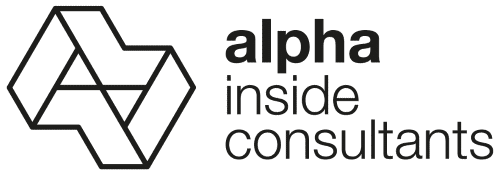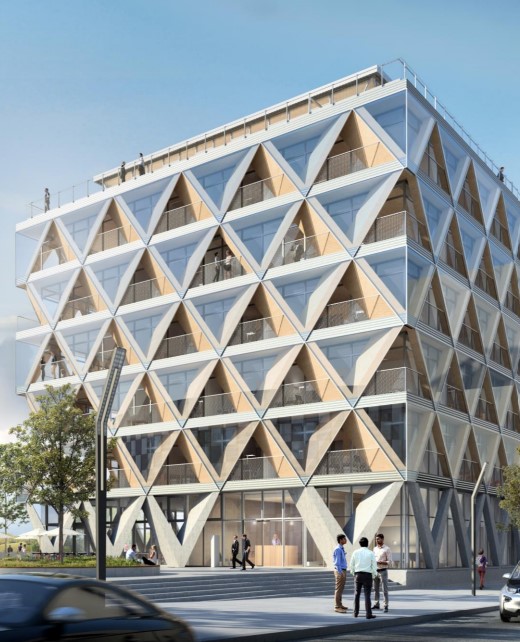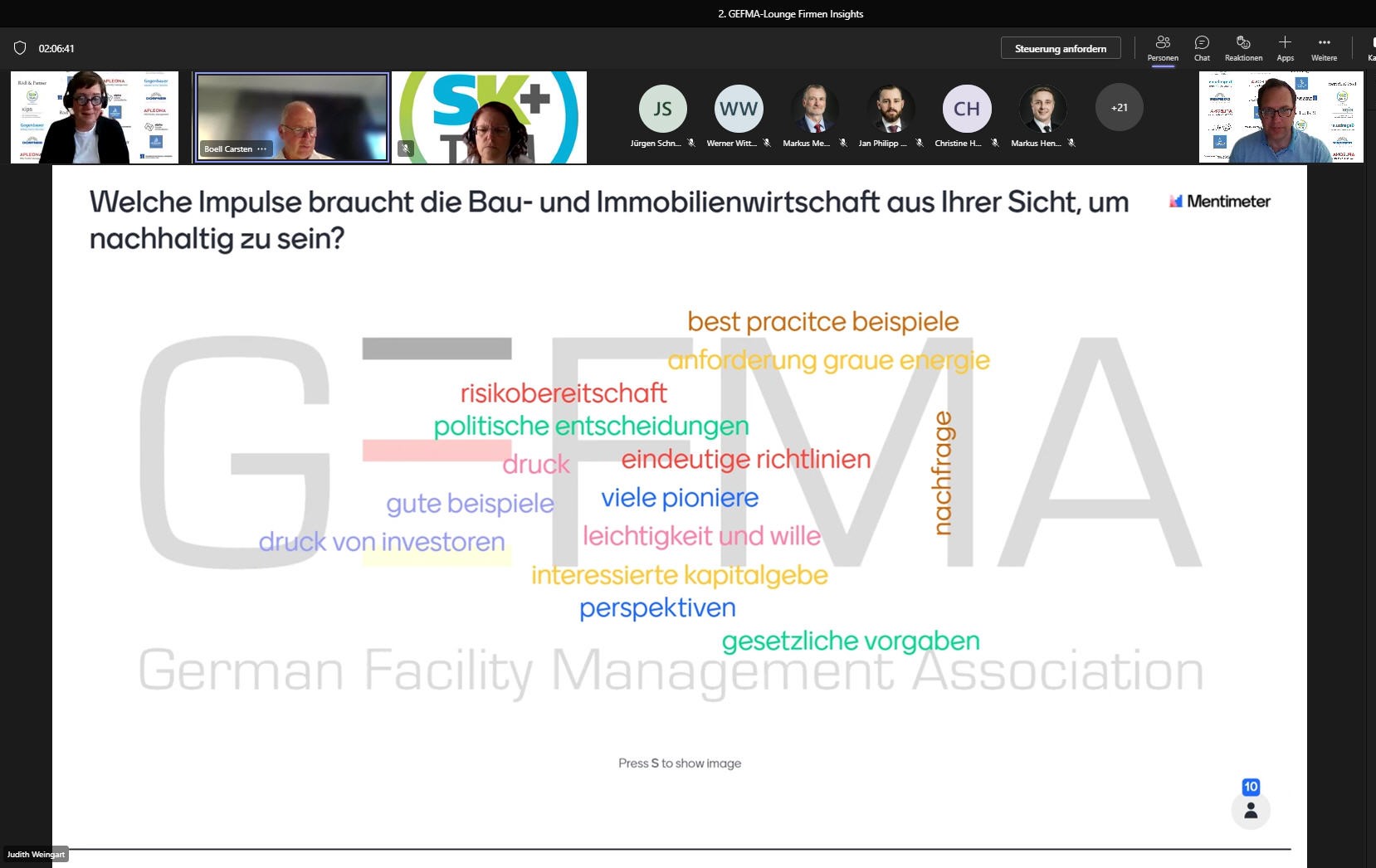Carsten Boell, Managing Director of INTERBODEN Innovative Gewerbewelten in Ratin-gen, mentions two things again and again in his presentation "Sustainable Project Development" at the GEFMA Lounge Bavaria-Nuremberg: "360°" and "at a very early stage". Thinking, planning and implementing sustainably means "thinking project development through to the end", starting with the acquisition - especially when it comes to the approach of the "Circular Economy", or "C2C" for short. So if the building that was the focus of the presentation, "The Cradle", is to be made of 60% CO²-absorbing wood, then it is necessary to think from the outset about how, for example, maintenance and cleaning can function. Then it must be ensured that the wood has been managed in a certified manner and is not delivered from far away already polluted with CO² and that controlled low-carbon supply chains are ensured.
This fundamentally life-cycle oriented approach has distinguished Interboden for decades. Accordingly, the Group already embedded ESG-compliant governance regulations in all corporate processes more than 15 years ago - long before ESG compliance became a transformation lever for financial and real estate products. Against this background, both GEFMA Managing Director, Jürgen Schneider, and Lounge Director, Sebastian Hölzlein, were grateful to have won Carsten Boell as an authentic speaker on the topic of "sustainability". A focus topic of the GEFMA, which obliges activity in the entire real estate value chain.
When the family-owned company Interboden won the city of Düsseldorf's tender for a project in the Medienhafen in 2017, it succeeded thanks to its sustainable development concept. They had committed to implementing the building according to the "cradle to cradle" principle - using recyclable pure materials that do not contain toxic substances and conserving resources. The concept includes an innovative "Shared Mobility Hub" on the first floor of the building, as well as the submission of a C2C management concept and a sustainable neighborhood app for pooling services. This capitalization of input for a "sharing economy" reduced the purchase price of the property, he said. "This is a prime example of what social impact investing is. What contribution am I making with my project to the users, to a neighborhood, to a city?" said Carsten Boell.
Avoiding waste as an inner logic of the circular economy is also an ecologically, economically and socially relevant benefit that needs to be taken into account. This aspect alone represents a major lever for an industry that is responsible for 59 percent of the world's waste. The project also includes other Cradle to Cradle measures, such as "green walls," retention roof, use of gray water, photovoltaic system, CO² monitoring, neighborhood app, etc. Also the striking archi-tectonic honeycomb structure of the building has its objective in an optimal illumination of the building for the users and thus avoiding the materiality of a sun protection system in the production and later management.
With the realization of the wood hybrid building "The Cradle", one has certainly "taken a few steps at a time" with regard to the Circular Economy in the construction industry. But the search for recyclable, pure, non-toxic and resource-saving materials has been a challenge. Whereas three years ago there were 4,000 materials to choose from, today there are already more than 9,000, says Carsten Boell. In addition, Interboden began working with the Dutch company "Madaster" at an early stage to create a material register and a building passport. "In this way, even 50 years from now, everyone will know what was used when and where. We basically have a transparent monetizable material database as a result, and we want others to learn from it as well," he said. The Cradle is thus the first project on the German Madaster platform and Interboden one of the first Madaster-Kennedys, as the 33 cooperation partners and ambassadors for the Madaster system are called. The second major challenge in the implementation of the project was the search for suitable, i.e. C2C-experienced and solution-oriented specialist planners - from structural design to building services engineering.
Also at an early stage in the project development, special green lease agreements were developed with far-reaching obligations for the tenants, including the provision of consumption data. Everyone agreed that this is currently the biggest obstacle to the energy-optimized and resource-saving operation of buildings. For "The Cradle", tenant training in the sense of resource-saving behavior is planned, as are criteria for a tenant fit-out in line with the cycle. The Green Lease clauses can extend to coordinated, centralized ordering and delivery of suitable office supplies or beverages, in order to avoid multiple individual delivery processes and thus CO². The many obligations and requirements of the Green Leases have in no way slowed down demand. On the contrary, according to Carsten Boell, 50 percent of the space had already been leased early in the project, before the building permit was issued.
When considering the profitability of the project, it is not only the classic factors that need to be evaluated from a holistic perspective. When looking for green bonds, sustainable returns are already priced in by the banks at the financing stage, emphasized Carsten Boell. The positive marketing effects for image and employer branding as a result of the various awards and reporting for "The Cradle" also pay off in terms of ROI, as do the contribution to research and teaching and the innovative edge gained.
With a view to the climate target of CO² neutrality by 2045 and the German "Overshoot" Day on May 4, 2022, Carsten Boell stated: "We are currently already living on credit. If we don't move, we will be moved, not only by the tangible consequences of climate change but also by regulatory sanctions imposed by legislators at national and EU level. The consequences of climate change can be dramatic in just a few years." That's why "best practices," like "The Cradle," are needed to learn faster, inspire and provoke "copycats." In this sense, he said, the Interboden team visited the Venlo City Hall at the beginning of the process as a very good example of the application of C2C principles in the building sector, which he also recommended to all the audience. New project developments are one thing, he said, but decarbonization in existing buildings naturally remains the industry's major challenge. As an extra motivation for the implementation of environmentally friendly and resource-saving projects, the speaker recommended that everyone read the book "Germany 2050" by Nick Reimer and Toralf Staud: "Climate change is not an abstract phenomenon of politics, but is happening here and now in our lives. And we can and must take action," Carsten Boell concluded. Translated with www.DeepL.com/Translator (free version)





